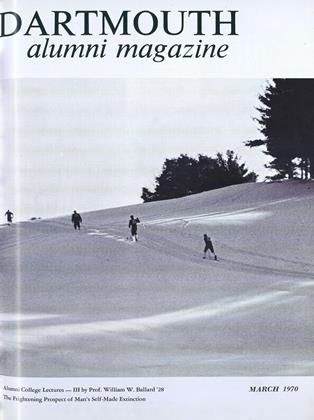By Robert L.Gale '42. New York: Twayne Publishers,Inc., 1969. 191 pages. $4.50.
Professor Gale's book, which combines biography with literary criticism, has as its subject a man who wrote one of the most enduringly exciting adventure tales in literary history. But what else is worth knowing about the younger Dana except what he himself relates in the autobiographical TwoYears Before the Mast? Its author, strangely enough, deprecated his sole claim to immortality as boy's work; he dashed it off in his early twenties, watched its rapid rise to popularity with the aloof detachment of an inveterate Boston Brahmin, and then proceeded to devote the rest of his life to practicing law. Dana, Gale decides, "was both a better writer than he realized and a less significant lawyer-politician than he aspired to be. From the point of view of most readers, it seems sad that he did not devote more of his titanic energy to literary work and less to his profession. Temperamentally, he was unsuited for the rough-and-ready politics for which America was noted in the period from 1850 to 1880. Ironically, he is known today not because he was an active lawyer and politician but because of one book, which he wrote in large part to bring business to his law office."
Dana's life, then, is of the ironic American variety, which as F. Scott Fitzgerald reminds us, has no second act; but the epilogue in this particular case is lengthy enough. Dana's ambitions as a public figure were mostly thwarted, and he never quite achieved the eminence he appears to have deserved. He finally died at the age of 66 in Rome, of all places, and was buried there in the Protestant cemetery near another ultimately unfortunate sailor named Shelley. But if Dana's career was one of frustration, that of his book has been a record of triumph from first publication in 1840 down to the present. Gale argues that Two Years Before the Mast is not just a persistently readable account of interesting voyages but literature too, and he makes this point carefully and cogently. The essence of Dana's narrative, he insists, is mythical: at the heart of the scrupulously detailed travelogue lies the eternal verity of the Quest. It becomes clear, in fact, that Dana's book provides exactly what his life lacked: a sense of fulfillment.
Mr. Maves is Assistant Professor of Englishat Dartmouth.
 View Full Issue
View Full Issue
More From This Issue
-
 Feature
FeatureThe Rise and Fall of Humanity
March 1970 By WILLIAM W. BALLARD '28, -
 Feature
FeatureTHE DICKEY ADMINISTRATION ENDS BUT NOT ITS PERVADING IMPRINT
March 1970 -
 Feature
FeatureDartmouth's Priorities for 1970
March 1970 -
 Article
ArticleThree Students Argue for Coeducation
March 1970 By CHERYL CAREY, Coed, RANDY PHERSON '71, RICHARD ZUCKERMAN '72 -
 Article
ArticleThe Undergraduate Chair
March 1970 By WINTHROP A. ROCKWELL '7O -
 Article
ArticleAn Antidote to Hugeness
March 1970 By CARLOS H. BAKER '32
Books
-
 Books
BooksFurther Mention
FEBRUARY 1972 -
 Books
BooksShelflife
May/June 2005 -
 Books
BooksIntroduction to Medical Biometry and Statistics
August 1924 By C. H. Forsyth -
 Books
BooksTHE CAUGHT IMAGE.
JULY 1964 By HENRY L. TERRIE JR. -
 Books
BooksUNDERSTANDING FINANCIAL STATEMENTS AND CORPORATE ANNUAL REPORTS.
May 1962 By LEONARD E. MORRISSEY JR. '48T -
 Books
BooksThe Grand Strategy of Evolution, The Social Philosophy of a Biologist
February 1921 By Wilbur M. Urban


